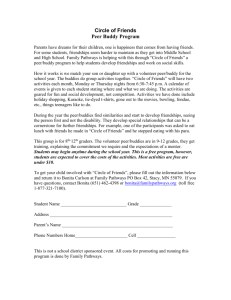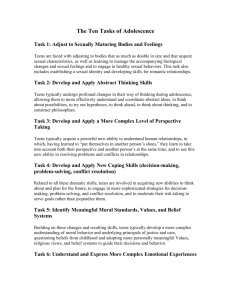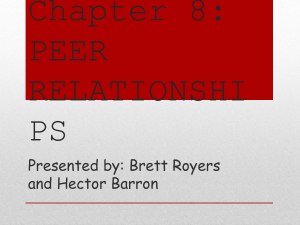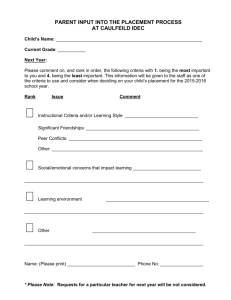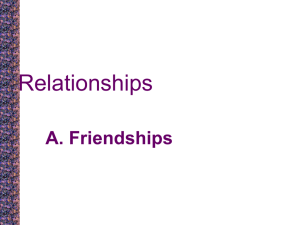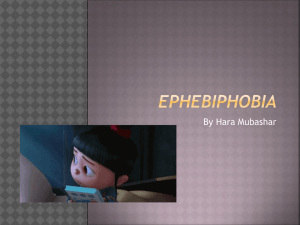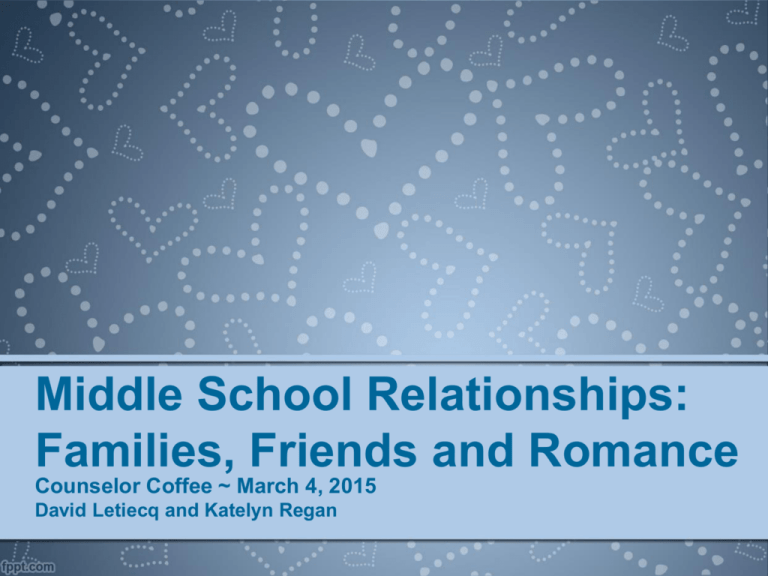
Middle School Relationships:
Families, Friends and Romance
Counselor Coffee ~ March 4, 2015
David Letiecq and Katelyn Regan
PARENT-CHILD
RELATIONSHIP
Parent-Child Relationships
• Adolescents are managing changing
relationships, responsibilities, and roles.
• Peer relationships increase in importance
(Parents are no longer all-knowing).
• Despite peer influence, parents still have
the greatest impact on adolescent
development
Conflict is normal
• They are negotiating a new independence
which cause conflict
• Conflict is temporary and necessary to reorganize the parent-child relationship
Balancing Your Role
It’s crucial that you find the balance
between: allowing them to examine and
sustain their independence WHILE still
protecting and setting limits / boundaries
The family unit as
a living system
• Everyone is connected
• The family grows and changes through
different life cycles
• A change in one member necessitates the
change in all other members
• Adolescents are doing nothing but
changing, which forces all other member
to change as well
So...
• Be open to changes
• Be flexible in your interaction patterns
• Get to know your child and the
changes they are going through
• Listen
• Connect
5 Love Languages
1. Words of Affirmation
2. Physical touch
3. Quality Time
4. Acts of Service
5. Gifts
Words of Affirmation
Actions don’t always speak louder than
words. If this is your love language,
unsolicited compliments mean the world to
you. Hearing the words, “I love you,” are
important—hearing the reasons behind that
love sends your spirits skyward. Insults can
leave you shattered and are not easily
forgotten.
Physical Touch
A person whose primary language is
Physical Touch is, not surprisingly, very
touchy. Hugs, pats on the back, holding
hands, and thoughtful touches on the arm,
shoulder, or face—they can all be ways to
show excitement, concern, care, and love.
Physical presence and accessibility are
crucial, while neglect or abuse can be
unforgivable and destructive.
Quality Time
In the vernacular of Quality Time, nothing
says, “I love you,” like full, undivided
attention. Being there for this type of person
is critical, but really being there—with the TV
off, fork and knife down, and all chores and
tasks on standby—makes your child feel
truly special and loved. Distractions,
postponed dates, or the failure to listen can
be especially hurtful.
Acts of Service
Can vacuuming the floors really be an
expression of love? Absolutely! Anything
you do to ease the burden of responsibilities
weighing on an “Acts of Service” person will
speak volumes. The words he or she most
want to hear: “Let me do that for you.”
Laziness, broken commitments, and making
more work for them tell speakers of this
language their feelings don’t matter.
Receiving Gifts
Don’t mistake this love language for
materialism; the receiver of gifts thrives on the
love, thoughtfulness, and effort behind the gift.
If you speak this language, the perfect gift or
gesture shows that you are known, you are
cared for, and you are prized above whatever
was sacrificed to bring the gift to you. A missed
birthday, anniversary, or a hasty, thoughtless
gift would be disastrous—so would the absence
of everyday gestures.
The Love Tank
Keeping your love tank full…so
that you can fill your child’s love
tank
Resources
• Gary Chapman’s “The Five Love
Languages of Teenagers”
• http://www.5lovelanguages.com
Table Talk
• What is something that someone has done
for you that has made you feel especially
loved?
• What is one thing you already do to make
your child feel appreciated?
• What is one new idea – based on Love
Languages – for celebrating your child?
FRIENDSHIPS
Research shows…
Research supports the notion that, to a
significant degree, the quality of family
interactions:
1. arises from the context surrounding the
family
2. is transmitted across generations; and,
3. has a demonstrable impact on the quality of
adolescents’ social ties outside the family
Cui, M., Conger R. D., Bryant C. M. Elder, Jr., G. H., Journal of Marriage
and Family, Aug 2002
Friendships: Essential
Component of Development
• Teens begin to develop friendships that
are more intimate, exclusive, and more
constant than in earlier years.
• New types (e.g., opposite sex, romantic
ties) and levels (e.g., best friends, cliques,
and “crowds”) of relationships emerge
Friendships are essential
• Provide safe venues where youth can:
– explore their identities
– feel accepted
– develop a sense of belongingness
• Friendships also allow youth to practice
and foster social skills necessary for future
success.
Facts about Friendships
• Teens often have multiple layers and
groups of friendships
– Often have multiple friends, belong to multiple
groups
– Might have intimate and close relationships
with one or a handful of individuals
– Might also belong to one or more groups of
friends that have similar demographics (sex,
race, socioeconomic status), orientation
towards school, and other interests
Facts about Friendships
• Peer friendships are dynamic
– Peer friendships may change
– Can have friendships that are long-term, but
they often move from one clique to another
– May develop new friendships and lose others
Table Talk
Given that friendships are naturally
dynamic during adolescence, how
might the TCK experience impact
this favorably or negatively?
Facts about Friendships
• Peers tend to choose those who are
similar to themselves
– Similarities based on gender, age,
socioeconomic status, ethnicity, or interests
– Teens tend to gravitate towards those who
are more similar to them
Facts about Friendships
• Peer friendships can be a healthy
venue for positive youth development
– Can be a safe place explore their identity,
learn about social norms, and practice their
autonomy
– Healthy friendships provide:
• social support
• some of the most positive experiences
Facts about Friendships
• Children who have trouble forming
friendships are more likely to…
– have poor self-esteem
– do poorly in school or drop out
– get involved in delinquent behavior
– suffer from a range of psychological problems
as adults
Parental Concern:
In spite of these facts…
• Parents and other adults can become
concerned when they see their teens
becoming preoccupied with their friends.
• Many parents worry that their teens might
fall under negative peer influence or reject
their families’ values and beliefs as well as
be pressured to engage in high-risk and
other negative behaviors.
Peer influence:
It’s more complex…
• The peak period for peer influence is
generally from 7th to 9th grades
• Peer influence can be positive & negative
– Can actually motivate youth to study harder in
school, volunteer, participate in sports and
engage in other productive endeavors.
– In fact, most teens report that their peers
pressure them not to engage in drug use and
sexual activity.
It’s more complex (continued)
• Peer influence is not a simple process
where youth are passive recipients of
influence from others.
– In fact, peers who become friends tend to
already have a lot of things in common.
– Peers with similar interests, similar academic
standing, and enjoy doing the same things
tend to gravitate towards each other.
Some Realities
• Negative Peer Pressure
– Kids seek FUN
– Teens’ brains are still developing, they can be
impulsive > they do not think before acting
– Kids aim to fit in and belong, some worry
about the “social cost” of not participating in
negative behavior
• When seeking to understand, the light
must also be shined on your child
Realities (continued)
• Bullying
– Real or perceived power differential
– Intent to harm
– Recurrent / pattern like
• Moments of Meanness
– Often happens between “equals” (* power
differential may be hard to detect)
– Typically impulsive or resulting from
frustration, not often pattern-like
– May or may not be intended to harm
Although the negative peer influence
is over-emphasized, more can be
done to help teenagers experience
the family and the peer group as
mutually constructive environments.
To minimize the negative effects of
peer pressure, youth, parents, school
and community leaders must come
together to establish workable and
effective strategies to guide teen
behavior and to support their
transition from children to mature,
responsible adults.
Strategies
• Model good friendships
– The example of friendship you provide has a
bigger impact on your child's friendships than
any lecture.
• Recognize that peer pressure can be
bad or good
– Most young teens are drawn to friends who
are similar to them.
Strategies
• Get to know your child's friends
– A good way to learn about your child's friends
is to drive them to events, welcome them into
your home, and listen.
• Get to know the parents of your child's
friends
– It helps to know if other parents' attitudes and
approaches to parenting are similar to yours.
– Knowing the other parent makes it easier to
learn what you need to know.
Strategies
• Monitor friendships to help your child
avoid risky and unhealthy behavior.
– Young adolescents need supervision,
including during after-school hours.
– Keep tabs on who your child's friends are and
what they do when they get together.
– Sticky situation: Let your child know that you
disapprove of a friendship and why, then limit
the amount of time and the activities that you
will allow with the friend.
Strategies
• Provide your child with some
unstructured time in a safe place to
hang around with friends
– Activities are important, but too many can
lead to burnout.
– Lets your child to share ideas and develop
important social skills.
– May help your child to change some
behaviors that make others uncomfortable.
Strategies
• Nurture teens’ abilities and self-esteem
so that they are equipped to foster
positive peer relationships and deflect
negative pressures
– Adolescents with positive self-concept and
self-worth will be less likely to be easily
swayed to follow others’ negative influences.
Strategies
• Encourage positive relationships
between significant adults and teens
– Potential adults: Parents, teachers, school
counselors, relatives, other “allies”
– Can serve as role models for healthy
relationships
– Can be a venue through which the teens feel
valued, can develop positive self views
– Youth should know that they can go to these
caring adults for help or advice about their
peer relationships.
Strategies
• Encourage diverse relationships
– Parents, teachers, community leaders, and
clergy can model appreciation for ethnic,
gender, socioeconomic status, religious, and
other differences and support cross-group
friendships.
– Schools and youth organizations can assist
by encouraging youth from diverse
backgrounds to work and play together.
Strategies
• Stay informed about the dynamics of
adolescent peer groups and the
demands and expectations teenagers
face in peer relationships
– Seeking information is not a sign of weakness
– Showing interest in these issues might
actually show your teens that you are
concerned about them.
Strategies
• Equip youth with the skills necessary
to resist negative behaviors, as well as
to make good decisions.
– It is essential that youth are given the
necessary skills to analyze situations and
make the appropriate decision.
– Includes helping youth develop the skills for
‘costs vs. benefits’ analysis — teaching them
to look at both the negative and positive sides
to making a decision.
Strategies
• Teaching youth exit strategies or ways
to say ‘no’ to negative pressures.
– Think about peer pressure ahead of time
rather than dealing with situations as they
occur or trying to recover afterwards.
– Talk to youth about potential scenarios, and
think through strategies or role-play together
on how to deal with them if they arise.
Table Talk
Share with your table mates the most
valuable way that you support your child in
building healthy friendships.
Citations
• Maria R. T. de Guzman & Herbert G. Lingren,
University of Nebraska – Lincoln Extension
http://www.ianrpubs.unl.edu/epublic/pages/publicationD.
jsp?publicationId=837
• U.S. Department of Education
http://www2.ed.gov/parents/academic/help/adolescence/
part9.html
Survey:
Should a parent attempt to be
a friend to their child?
Parents as Friends:
Important distinctions
• Parent – Child Relationship
– An un-chosen relationship
– Based on bonded attachment & family responsibility
• Peer-to-peer friendship
– A mutually chosen relationship
– Based on compatibility and commonality
Carl E Pickhardt, Ph.D., Author of Surviving (Your Child's) Adolescence
Posted on Psychology Today website on Nov 05, 2012
Parents as Friends
• Parent must be able to distinguish
between two styles of parenting:
1. Vertical parenting (parent asserts authority
from a superior position)
2. Horizontal parenting (parent and teenager
can relate on equal footing, person to
person)
When it can be beneficial
• Fares better the more horizontal their
relationship can be (e.g., having equal say
they can find a mutually agreeable way to
resolve a conflict)
• When parents must take vertical positions,
can be hard for the teenager to accept
• The parent can explain the wish to be
flexible when possible, but will be firm
when (out of loyalty to the teenager’s
welfare) they feel they must.
When it can be costly
• Close adolescent friendships with peers
may not be made by your child
• For only children*, as child acts more and
more adult-like from this adult association,
he or she can become more socially
dependent on parents and more socially
out of step and uncomfortable with agemates
• Potentially hampers further separation,
individuation, and identity development
EMERGING SEXUALITY,
CRUSHES & ROMANCE
Some things to consider…
They are physically, chemically,
and emotionally developing
• Complex and critical aspects of
adolescence:
– sexual attraction and behavior
– sexual and gender identity
– negotiating intimate relationships
• Hormone levels change dramatically
during adolescence. Hormones have a
powerful effect on emotions and behavior
http://www.actforyouth.net/
Puberty
• Technically, the time that people become capable
of sexual reproduction.
• 5 physical events of puberty
1. Growth
2. Body arrangements change
3. Circulatory and respiratory systems change
4. Development of primary sex characteristics
5. Development of secondary sex characteristics
• Everyone follows the same process, but not at the
same time
Teenage Romantic Relationships
• Shorter…they seek lots of experiences
• They help teenagers develop an
understanding of qualities they like and
don’t like
• These feelings are confusing (and a lot of
times new) … but REAL!
• Feelings can be very intense and
completely consuming
www.teenshealth.org
Teens are developing
a sexual identity
• Gender
Identification
–
–
–
–
Male
Female
Transgender
Intersex
• Sexual Orientation /
Identity
–
–
–
–
Heterosexual
Homosexual
Bisexual
Asexual
** Questions / Experimentation
is NORMAL **
Attraction & Crushes
The ability to feel romantic love develops during
adolescence
Attraction: the "chemistry" part of love. It's all about the physical - even sexual -- interest that two people have in each other.
Closeness: the bond that develops when we share thoughts and
feelings that we don't share with anyone else. Trust is a big part
of this.
Closeness – Attraction = Friendship
Attraction – Closeness = a Crush
Attraction + Closeness = Romantic Love
www.teenshealth.org
Why dating is good?
Kids learn:
• cooperation skills and sharing of activities
• socially appropriate behavior and manners
• interdependence and companionship
• compromise
• empathy and sensitivity
• how to develop an intimate, meaningful
relationship
Table Talk
How does your upbringing or culture shape
your own view on attraction, closeness,
sexual identity (hetero-, homo-, etc.),
crushes and dating?
Risky Behaviors
• Teens are developing romantic
relationships and engaging in sexual
behaviors at an earlier age than before
• Risky behaviors: early onset of sexual
activity, non-use of contraceptives and
non-use of condoms
• Risks: pregnancy, SDIs / STIs, sexual
abuse, emotional harm
Statistics
• 8,000 U.S. teenagers get an STD every day
• 3 million teenagers get an STD in one year
– Teens who pledged virginity until marriage are equally
as likely as their peers)
• 3 in 10 teen American girls will get pregnant at
least once before age 20…nearly 750,000 teen
pregnancies every year.
• 26 percent of teen pregnancies end in abortion
www.dosomething.org
Everything but intercourse
“In high school I always knew that sex was
wrong. I got that. But I didn’t know how far
was too far. I didn’t know what else, if
anything, was bad. And so I experimented.”
•Oral sex
•Anal sex
•Sexting
Social networking / media
• Reshaping our kids experiences
– Friendship access: 24/7
– “Dating” online
– Talking to strangers
– Access to adult content
– Desensitization
– False sense of safety for experimentation
– Sexting
Sexting
“An exchange of self-generated sexually explicit
images, through mobile picture messages or
webcams over the internet.”
– Cybersex
– Sending a nudie, picture or selfie
Potential Dangers:
–
–
–
–
NOT harmless
Illegal
No control of sharing
Blackmail, bullying, unwanted attention,
emotional harm
Talking to your kids
about sex
Quick facts
•
•
•
•
Parents are the most important educators
You don’t have to be an expert
Talking about sex does NOT lead to sex
Teens often overestimate the percentage
of their peers engaging in sexual
behaviors
• Teens with high self-esteem are more
likely to make responsible decisions about
sex
How to talk to your child
about relationships and sex?
•
•
•
•
•
•
•
Be clear about your values
Talk about facts vs. beliefs
Practice what you preach
But don’t preach – have a conversation
Encourage a sense of pride
Keep the conversations going
Keep your sense of humor
Other quick tips
• If it is difficult for you, admit it
• Use media and real-life to begin talking
• Don’t make assumptions about what
your teen knows or is engaging in
• Ask them what they want to know (if
you don’t know the answer, admit it)
Other quick tips
• Talk about ways to handle pressure
• They need to know they will not be
punished for being honest
• Have books and articles around the
house
DATING
Start with yourself
• Create your road map when facing
uncharted territory.
– Iron out how you feel about it when your teen
begins to show an interest in dating.
– Get an understanding about what dating
means currently to your child.
– Consider your values, your expectations and
your limits.
– Be ready to be assertive if / when
expectations are not met.
Start with yourself
• Be a good role model.
– Your relationship with your partner is a model
for how your teen will behave with others.
– Your relationship for your child speaks far
louder than anyone’s words.
– Show them how you compromise, stick up for
yourself, give and expect respect and argue
but love your spouse.
Start with yourself
• Remember that dating is exciting and fun,
and can be a tremendously positive
experience for your child.
• Remember that their experience and their
feelings are real!
• Commit yourself to being there for your
child throughout all stages.
– Plan to listen to, support, empathize, and
advise through all of the stages (crushes,
relationships, break-ups). Consider “allies” in
case you’re not around.
With your child…
• Talk to your teen about what a good
relationship is.
– Discuss what it means to be in a loving and
supporting relationship.
– Reinforce your values around dating and
relationships by discussing and modeling
them.
– Understand that this does not have to be all
one talk.
– When you’re finished talking, write down your
thoughts on the conversation. Follow up.
With your child…
• Encourage your child to decide BEFORE
he / she starts dating what kind of people
he / she will date.
– Invite your child to decide what is off limits for
him / her. Encourage your child to have a plan
before going on a date.
With your child…
• Have the sex talk.
– Make them think seriously about what sexual
intimacy really means to them.
– Clarify that oral sex and anal sex are sex.
– If consistent with your values, tell them they
shouldn’t be having sex yet, and that you hope
they will wait. But if they don’t, it’s best that they
protect themselves, so tell them about
contraception.
With your child…
• Warn them about unhealthy / abusive
relationships.
• Remind them that you are always
available for support and assistance.
With your child…
• Tell them to listen to their inner voice.
– Help them pay attention to the voice inside
that says, “I’m uncomfortable in this situation
and don’t want to do this.”
– Teach them to trust their judgment.
– Tell them how to avoid unwanted sexual
advances.
– Tell your sons that having sex does not make
them a man and tell your daughters that
having sex does not make them cool.
With your child…
• Once your child starts dating, maintain
open lines of communication, reiterate
how they should treat people and
expect to be treated in a relationship.
• Let them talk privately with their doctor
so they can get what they need to take
care of themselves.
Regarding the person
he / she dates…
• When it comes time to meet your teen’s
date, be kind and respectful.
– While you may want to give a lecture on the
rules; their date is not the one you should be
talking to.
– It is your teen’s responsibility to know your
rules and follow them.
Regarding the person
he / she dates…
• While you may not like the person your
child is dating, be supportive.
– If you have taught them about a proper
relationship, then you should trust them to
make their own decisions.
– Only intervene if you think the relationship is
dangerous for your child.
Advice for Girls
• Sex doesn’t seal a relationship. Don’t
assume that having sex with a boy makes
a relationship any more than it was, other
than that the guy now thinks he can have
sex with you again.
• Guys often do mean what they say at the
time, but don’t assume that they will feel
that way later – even a little later.
Advice for Girls
• Don’t assume it will be private. In the age of
social media, what you did last night – or just
this afternoon – can rapidly become public
knowledge
• Sexuality can create a flood of feelings,
making it harder for you to stay in control
than you can in other situations.
• Drinking – by you, him, or both – makes the
probability of sex considerably greater & its
meaning considerably less.
Advice for Girls
• If you are in a situation where sex may
happen – alone with no adults – it is more
likely that it will happen.
• If he is jealous and controlling, drop him
• If he in any way is physically hurtful – drop
him instantly, then tell friends and adults. Do
NOT keep that a secret.
• Prior to a situation where you think you might
engage in some form of sexual activity, think
about how far you want to go.
Advice for Boys
• No means no
• Physical force is seriously never okay
• It is not okay to have sex with someone
who has a diminished capacity to say no –
if they are drunk, drugged, or suffering
from any other impairment.
• It is never okay to make fun of a girl’s
body.
Advice for Boys
• If a girl puts herself in a situation where
she is vulnerable – drinking alone with you
for example – it does not automatically
mean yes.
• What you do sexually with a girl is a
private matter between the two of you.
• It is never okay for you to have sex without
a condom. It’s dangerous to both you and
your partner.
Advice About Abuse
“Many people abuse their boyfriends
/girlfriends. I’m not saying that I think you will
or that you do. But many do and I want you
to know clearly what behaviors constitute
abuse. Here are some rules. All the
behaviors that I’m going to list are abuse,
and you must never do them under any
circumstances.”
Advice About Abuse
• You may never hit – ever
• You many never grab hard – ever
• If someone gets physical with you – either
hitting or kicking or threatening you with
physical harm – leave. Leave right away.
Hitting is self-defense is not okay.
Advice About Abuse
• If you are in an argument and are mad,
you must back away. Sometimes an angry
person standing very close can be very
scary, even though you know that you will
not do something physical.
• If you find yourself getting very mad, leave
Advice About Abuse
• Don’t get into an argument if you’ve been
drinking. If you have been drinking an
argument starts, leave. These are
potentially very dangerous circumstances,
as they are often where the most serious
abuse occurs.
Table Talk
Based on this presentation, what are some
things that you are doing well, and what are
some ideas that you have for moving
forward with your teen?
Citations
Sean Covey, The Six Most Important Decisions You Will Ever Make:
A Guide for Teens
Dr. Gail Saltz, psychiatrist with New York Presbyterian Hospital and
“Today” contributor
http://childdevelopmentinfo.com/ages-stages/teenager-adolescentdevelopment-parenting/teen-dating/
http://parentingteens.about.com/od/teenculture/a/teen_dating2.htm
Anthony E. Wolf, I’d Listen to My Patrents if They’d Just Up


